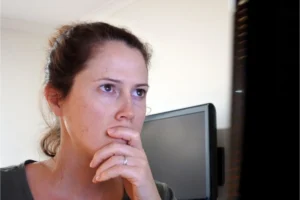Listen to the No Porn Marriage podcast.
Dave had just arrived in Afghanistan on a four-month deployment when he received an urgent phone call from his wife, Katie, who was six months pregnant. She had found a printout of an email exchange between him and another woman. After Katie finally stopped yelling, she demanded a response. Dave desperately tried to explain away the email conversation. Katie listened and, before hanging up, said, “You’re a liar, and your stuff will be on the porch when you get home.” Dave called Katie back, and before she could hang up again, he confessed: “You’re right. It’s all true. I have a problem, and I need help.” This was his first step toward hope and change.
Acknowledging his issues to Katie had been incredibly difficult. It was a secret that Dave had guarded for years. He had been 14 years old when he found his father’s magazines in the garage. Within a couple of years, he began searching for porn online.
Dave had been living a double life. He was a loving husband to a pregnant wife and an attentive father to a 2-year-old son. He was a man of faith who served his country through military service. Yet he was also a man who had online affairs with women and compulsively masturbated while viewing pornography. The shame felt like a weight pulling him down. How could Katie ever forgive him for this? How could he forgive himself? Was there really something out there that could help him change?
Dave and Katie are just two of the millions of people whose lives have been damaged by pornography. Christians aren’t immune, and most likely someone you know — a man or a woman — is struggling with pornography. It’s a complicated issue that’s not just about sex, but there is hope for recovery. With guidance and hard work, users can overcome their addiction, and relationships can be restored.
The magnitude of the problem
Finding valid statistics on the prevalence of pornography is challenging. However, the web-filtering company Covenant Eyes created a report, “Porn Stats,” that contains some of the most updated statistics available. Among the startling statistics reported are these: 40 million Americans routinely view online pornography; about a third of Americans search for pornography at least once a month; every second, more than $3,000 is spent on internet pornography. Fifty-five percent of married men and 25 percent of married women report viewing pornography a minimum of one time a month. Some studies have suggested that more than half of divorces are attributed at least in part to online pornography.
Young people are being exposed to sexuality in ways that were not possible in earlier generations. The explosion of internet availability has made it easier than ever for children to accidentally stumble across adult material. A simple misspelling can pull up a highly sexualized website. According to Covenant Eyes, 93 percent of boys and 62 percent of girls are exposed to pornography before age 18, and 14 percent of boys and 9 percent of girls are exposed to pornography before age 13.
Young people are susceptible to repetitive pornography use because of innate curiosity. As they turn to the “high” of pornography use more frequently, they become addicted. Addiction may also begin as a distraction from difficult life issues, such as peer pressure, bullying, sexual or physical abuse, gender confusion, anxiety or depression.
Many users struggle with negative self-talk and believe that something is fundamentally wrong with them. They fear that if they let people get too close, they will be exposed as a defective person and thus risk rejection and pain. Addiction becomes a way of self-protecting and medicating these painful feelings. But the emotional relief that comes from viewing pornography quickly fades, so the addict has to continuously feed his or her addiction to keep the hurt at bay, and each episode creates more shame.
Covenant Eyes Can Help You Quit Porn for Good
Covenant Eyes is designed to help you and those you love live free from pornography. This Accountability-based service is safe, secure and proven effective at helping members overcome porn addiction. Start your journey to freedom today.
Learn More
Getting help
Because porn addiction has such a strong emotional pull, rarely can an addict overcome it without help. The best approach is usually to seek a qualified counselor, who can guide the addict through the steps of recovery.
The first step is confession, which can be a complicated process, so enlisting the help of a counselor is essential. Unless the betrayer carefully thinks through the confession, he or she is prone to omit critical details, rationalizing that they are insignificant or too extreme. But the information will most likely come out later in the recovery process, causing further distrust and opening wounds that have barely begun to heal.
A large part of counseling involves helping couples learn to be truthful and authentic with each other to rebuild trust. For example, one of the first things that Dave and Katie’s counselor did was to encourage them to confess their full sexual histories and sins to each other so that, having laid everything on the table, they could sort through what was left of their lives. The counselor helped them talk through questions, such as “Are the details helpful or hurtful?” and “To whom does the offender confess — his wife, family, children?”
The effects of the past
Counselors can also help the betrayer and the betrayed work through their family histories and learn the ways that their emotions have been shaped by experiences, particularly traumatic events, throughout their lives. Both individual and marriage counseling are important to provide the best opportunities for recovery and to rebuild the relationship.
Katie chose to take part in individual counseling and learned how to communicate better. She found help and healing for her own childhood wounds that had caused her to be somewhat overbearing and critical. She understood that her struggles in no way caused Dave to act out with pornography, but seeing how her childhood wounds prompted her to react helped her grow, too.
The couple reflected on their negative interactions and were able to link some of those to previous wounds or core beliefs. Katie and Dave discovered how to identify and share their feelings and needs with each other. And they learned how to take responsibility for their own needs and to employ healthy self-soothing measures when needed.
The process of forgiveness
Because the process of forgiveness is often misunderstood, it’s another big issue for couples whose relationship has been damaged by pornography. Forgiveness is not the same as denial, condoning, forgetting or minimizing hurtful behavior. Some people believe that if they choose to forgive, the pain of betrayal will automatically go away; however, in most situations, this isn’t the case. As Christians, we are called to forgive, but this does not remove the consequences of wrong actions. Furthermore, attempting to forgive too quickly can hinder recovery because it may be a subconscious attempt to avoid problems.
Bravely acknowledging and feeling the hurt and other emotions associated with betrayal are imperative to the process of genuine forgiveness. As couples express and work through these feelings, the pain eventually will begin to subside.
Community support
While counseling is essential to the recovery process, it’s not the only means of help. Addicts intent on their full recovery should join a group that provides understanding, encouragement and accountability. These groups are often 12-step programs (or similar programs) and usually help arrange one-on-one recovery partnerships for participants, too.
Dave joined a men’s sexual addiction recovery group. For two and a half years, he met with his group weekly to share his struggles and victories. The group worked a 12-step program to overcome sexual addictions, and they offered accountability by challenging any thoughts or behaviors that did not support recovery. Even through occasional failures, Dave found reassurance and encouragement to keep fighting, and in this safe environment, he finally was able to honestly face and work through his issues.
After diligently focusing and working on his recovery through individual, marriage and group counseling, Dave began courting Katie again. He was undeniably grateful that she was willing to work on forgiving him and learning to trust him again after all he’d done to hurt her. After 15 months of separation, she moved back home. Dave and Katie continued marriage counseling, and he learned how to be the husband God always intended him to be. Eventually Dave and Katie developed an intimacy neither of them thought was possible. Now, one day at a time, they continue to grow together.
Connect With A Counselor
A variety of issues can fuel habitual pornography use. Understanding the deeper needs of individuals affected by this common problem is important. Reach out to well-trained helpers, and if you are a married couple, do so together. Change is possible! We can guide you as you seek a referral and take your first steps toward recovery. You can contact us Monday through Friday from 6 a.m. to 8 p.m. (Mountain time) at: 855-771-HELP (4357) or help@FocusOnTheFamily.com














